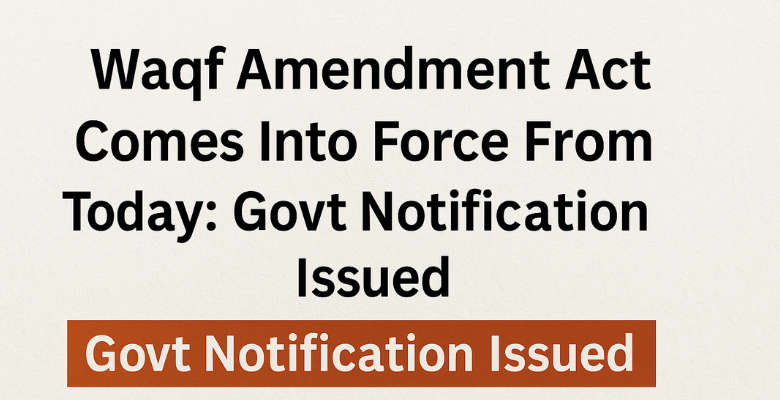Waqf Amendment Act Comes Into Force From Today as Govt Issues Official Notification

Waqf Amendment Act Comes Into Force From Today: Govt Notification Issued
Big changes often come with bigger debates — and today marks one such moment. A new law that has stirred both political and legal discussions across the country is officially in effect starting now.
Waqf Amendment Act comes into force from today, April 8, 2025, following a formal announcement from the government. The Gazette of India, the official publication for all government laws and orders, released a notification declaring that the amended law is now active.
This comes just a few days after President Droupadi Murmu gave her assent to the Waqf (Amendment) Bill, 2025, on April 5, turning it into a full-fledged Act.
Contents
What Does the Government Notification Say?
According to the official Gazette notification:
“In exercise of the powers conferred by sub-section (2) of section 1 of the Waqf (Amendment) Act, 2025 (14 of 2025), the Central Government hereby appoints the 8th day of April, 2025 as the date on which the provisions of the said Act shall come into force.”
This means that the provisions of the Act are now legally binding and in effect starting today.

What Is the Gazette of India?
For those unfamiliar, the Gazette of India is a legal publication that carries all important government notifications, bills, and legal decisions. It acts as the official document to inform the public about any new law or policy.
President’s Assent and Parliamentary Debate
- On April 5, President Droupadi Murmu approved the Waqf (Amendment) Bill.
- The Bill had already been passed by both houses of Parliament after intense discussions:
- Rajya Sabha: Passed post-midnight on April 4, with 128 in favor and 95 against.
- Lok Sabha: Cleared post-midnight on April 3, with 288 members supporting and 232 opposing the Bill.
This law has become one of the most debated in recent times due to its potential impact and wide-ranging implications.
Legal Challenge: Pleas Filed in Supreme Court
The story doesn’t end here. Multiple petitions have already been filed in the Supreme Court, challenging the constitutional validity of the Waqf (Amendment) Act, 2025.
Here’s what you need to know:
- Over 10 petitions were filed, including from:
- Political figures
- All India Muslim Personal Law Board
- Jamiat Ulama-i-Hind
- The Centre has responded by filing a caveat in the Supreme Court.
(A caveat is a legal request to the court to ensure that no ruling is made without hearing the party that filed it.) - Senior advocate Kapil Sibal, representing Jamiat Ulama-i-Hind, brought the matter to the attention of a bench headed by Chief Justice Sanjiv Khanna on April 7.
- The court assured consideration of listing the case, possibly on April 15, though it has not yet appeared on the Supreme Court website.
What Happens Next?
As the Waqf Amendment Act comes into force from today, the focus will now shift to the Supreme Court hearings. The outcome could determine whether this law remains in its current form or faces changes based on constitutional scrutiny.
Also read | Waqf Amendment Bill 2025 Passed: What It Means For Muslim Properties In India
Stay updated with all legal and political developments only on Bharat Details.
Let me know if you’d like a Hindi version or a social media caption/post for this article!

